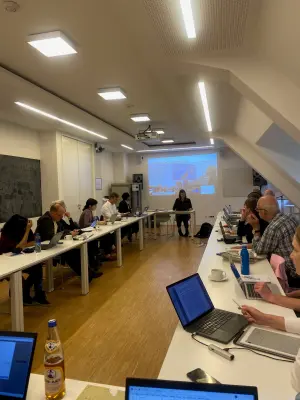
DigID Advisory Board Meeting
From 8 to 10 October 2025, the DigID team hosted its Advisory Board Meeting (ABM) at Leuphana University Lüneburg. The three-day event brought together advisory board members, scholars, practitioners, and representatives from civil society organizations for a series of discussions on current research progress and future directions within the project. The meeting also allowed contribution from invited guests about the relevant work that they do.
The program opened with a session on The Transnational Field of Identification, which examined the global networks, actors, and policy agendas shaping digital ID systems. Subsequent panels explored Digital ID as Infrastructures of Citizenship, addressing how identification technologies reconfigure belonging and rights. Then, Proliferating Digital ID Wallets, which examined the rapid emergence of wallet-based identity systems. Lastly, The Future of E-Governance Platforms, which reflected on emerging data infrastructures and citizen-centric governance models.
In addition to the panel sessions, participants engaged in a World Café on Counter-Mapping Identification, where DigID researchers presented two experimental counter maps that translate complex field insights into interactive visualizations. The meeting also included an excursion to Germany’s leading biometric technology provider, Dermalog, in Hamburg that offered DigID team members and ABM participants a hands-on view of contemporary developments in identification and border management technologies.
The 2025 meeting provided a valuable space for cross-regional dialogue, allowing academic and non-academic participants to exchange perspectives on the evolving landscape of digital identification and its implications for governance, citizenship, and everyday life. The event also enabled DigID team members to receive valuable feedback from diverse perspectives.
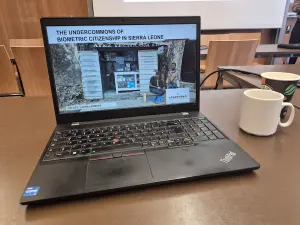
For the Undercommons of Biometric Citizenship in Sierra Leone?
DigID researcher Laura Lambert attends “Un-Commoning Anthropology” Conference
In Sierra Leone, people engage in fleeting practices of living, feeling and working otherwise than predetermined by postcolonial borders and the national order of biometric citizenship. To frame these practices, DigID researcher Laura Lambert has drawn on “The Undercommons” by Harney and Moten (2013). Speaking from a Black radical tradition, the authors examine these fugitive moments of subversion that – often vaguely – point to other ways of being together, feeling and living that go beyond the status quo.
Laura found such moments at the border crossings between Sierra Leone and Guinea when people identified as “commoners” who dwelled on both sides of the border and tacitly refused to show papers to border guards. Others refused getting the new digital ID cards, while many would use alternative bottom-up IDs to cross borders or do money transfers. Would it help analytically to speak of “fugitive citizenship” (Stancliff 2023) here even if there are no alternative political spaces created? In how far is there a risk of projecting a purpose into people’s practices that often perform a “neither for nor against” the border? Laura used the chance of the 2025 Conference of the German Association of Social and Cultural Anthropology in Cologne under the theme of “Un-/Commoning Anthropology” to ponder over these questions together with 700 other anthropologists.
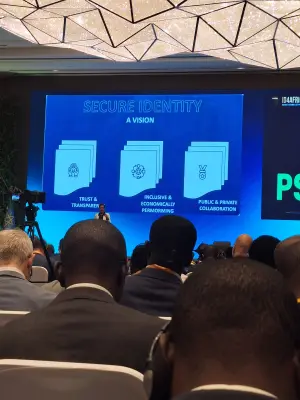
Researching the transnational field of identification: Kelly attends the ID4Africa in Addis Ababa
DigID associated researcher Kelly Bescherer recently attended the ID4Africa’s 2025 Annual General Meeting in Addis Ababa as part of her fieldwork on the transnational field of identification. ID4Africa, an organization which self-describes as a “movement”, organizes regular meetings for knowledge exchange and capacity building in African identity ecosystems. The topic of this year’s meeting was “Identity at Scale” and was attended by approximately 2,300 delegates who convened beneath the chandeliers of the Ethiopian Skylight Hotel. The meeting brought together together stakeholders from African governments, tech companies, NGOs, and international organizations.
Kelly was particularly interested in trying to understand how stakeholders see the connection between identity systems and migration governance. In the legal identity symposium, for instance, speakers from the IOM explained what they see as the link between their work on identification systems and deportation. A similar observation was also made in the talk of a delegate from the Côte d’Ivoire, however some presenters shied away from connecting their work so directly to migration control.
Kelly was also interested to understand more about the political economy around identification and how the identification industry influences decisions around identification. Many speakers such as IN Groupe’s CEO Agnès Diallo (also the former executive director of EU-Lisa) highlighted the role of industry-government collaboration in shaping developments in the field of identification.
While many presentations offered polished visions of progress on implementation in different national contexts, some of the frictions became more apparent in discussions in the vendor area. In the meeting’s substantial exhibition space, over 100 exhibitors hawked biometric technology, document printing technology, and software. Vendors interactively displayed technology, for instance offering delegates the possibility to scan their own irises, and awarded prizes to those who visited several different booths. In personal discussions, Kelly learned from delegates about the role of funding cycles in shaping identification, the importance of the ID4Africa as an event for European vendors to find new customers, and the difficulties of African tech actors in establishing themselves against some of the massive corporations already dominating the identification scene. Such discussions point to a need to dig deeper into the economic interests behind the ever-expanding transnational identification scene, which at time seems far more oriented towards profit maximization than “sustainable development”.
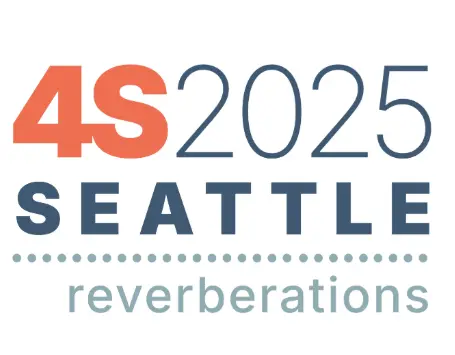
Participation on 4S 2025
On 5 September 2025, Sindhunata Hargyono remotely presented his dissertation research at the annual meeting of the Society for Social Studies of Science (4S). His presentation, titled “Monumental Borders: The Configuration of Techno-Nationalism in Indonesia’s Border Infrastructures,” examined Indonesia’s nationwide border infrastructure development policy between 2014 and 2020. Drawing on aesthetic governmentality, infrastructure studies, and science and technology studies (STS), Dr. Hargyono analyzed the design and construction of monumental checkpoints and “smart” piers to show how nationalistic discourses and symbols are materialized in their architecture and how these infrastructures performatively reconfigure the meaning of territory and citizenship at the border.
Being political? Navigating criticality and dissent with(in) and beyond Science and Technology Studies
The European Workshops in International Studies (EWIS) is a yearly event, established by the European International Studies Association to foster transnational debates among scholars interested in global politics. At this year´s event on hybridity, liminality, and ambigiousness, held in Krakow from July 1 to July 4 2025, DigID PI Stephan Scheel organized a panel titled "Being Political? Navigating criticality and dissent with(in) and beyond Science and Technology Studies" together with Jasper Van der Kist.
The panel sought to discuss the productive intersections between Science and Technology Studies (STS) and border, migration, and security studies. Panel contributors debated how borders and boundaries could be understood through the lens of fragility and contingency, and how critical scholars can attend to precarity and vulnerability in STS-inspired research. Another major theme concerned subjectivity and the modes of its production in STS-informed research. These topics were explored in relation to issues such as cyber arms control, border control, civil society and digital activism, and military practices of domination. DigID researcher Salah El-Kahil also contributed to this discussion with a paper presentation on civil society practices in the context of digital identity wallets.
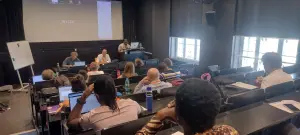
The Sociotechnical Lives of Digital Identification: Intermediaries, Citizenship and Belonging
Panel at European Conference on African Studies, Prague
Dr. Georges Macaire Eyenga (University of the Witwatersrand) and DigID researcher Laura Lambert organized a joint two-session panel at the European Conference on African Studies to explore how issues of intermediation, citizenship and belonging shape and are shaped by digital identification on the African Continent.
In this panel we paid particular attention to intermediaries—whether human, such as registration agents, NGOs, or public operators; or non-human, such as databases, authentication software, and biometric infrastructures. How do these actors and artifacts contribute to shaping citizenship in contexts where the state is often fragmented, outsourced, or in tension with other forms of authority? What kinds of belonging do they produce—or dismantle?
The panel united some of the leading researchers on digital identification on the African continent and featured diverse case studies on Côte d’Ivoire (Richard Banégas and Armando Cutolo), Malawi (Enifa Mituka and Stephan Scheel), Mauretania (Hassan Ould Moctar) and MOSIP in Africa (Keren Weizberg and Aaron Martin). Keith Breckenridge (University of the Witwatersrand) acted as a discussant.
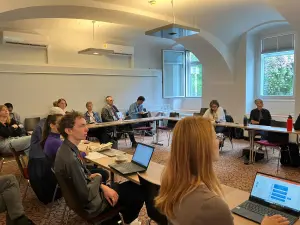
STS Conference Graz 2025
In May, PhD. Researcher Oisín O’Brien attended the 23rd Annual STS Conference in Graz, Austria.
This conference focussed on critical issues in Science, Technology and Society Studies. It was organised by the Annual Conference of the Science, Technology, and Society Unit of the Institute of Human-Centred Computing at Graz University of Technology, the Interdisciplinary Research Centre for Technology, Work, and Culture (IFZ), and the Institute for Advanced Studies in Science, Technology, and Society (IAS-STS).
Oisín presented preliminary work on accounting for material devices in the enactment of trust relations regarding digital identification in Estonia. Oisín attempted in this talk to move away from classic trust literature in sociology/anthropology, to consider the messy and multiple weavings of relations through a lens of material semiotics. The presentation explored how trust can be inscribed into the fabric of digital materiality, as well as how users mutate and distort the socio-technical construct that trust itself on an ongoing basis. This was based on in-depth textual analysis and preliminary interviews with a variety of Trust service providers.
His contribution was part of the panel, Digital technologies and social services in the welfare state. The panellists spoke about topics relating to the challenges and opportunities in delivering public services in the digital age. Issues surrounding ex/inclusion arose with examples from a variety of European contexts analysing how digital infrastructure can help reach vulnerable citizens more easily but can also extend societal bias digitally. The conference was highly engaging with an array of fascinating debates and presentations on topics such as digital post-humanism, thinking with generative AI and the future of queer STS. You can find a full description of all the presentation here.
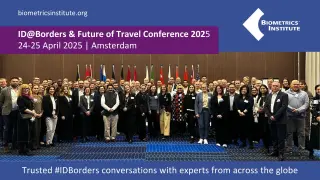
DigID Researchers Attended the ID@Borders & Future of Travel Conference 2025 (24-25.04.2025)
From 24th of April until 25th of April, Kelly Bescherer and Salah El-Kahil attended the "ID@Borders & Future of Travel Conference 2025". The conference was organized by the Biometrics Institute in Amsterdam and brought together different stakeholders in the biometrics industry. Founded in 2001 in Australia, the Institute describes its raison d’être as promoting " the responsible, ethical and effective use of Biometrics and related technologies that respect the Institute’s ethical guidance as an independent and impartial international forum for biometric users and other invested parties". However, the institute’s heavy involvement with industry, with suppliers paying a hefty fee for institute membership, raises some questions about its impartiality. The ID@Borders meeting is one of the regular events that the institute hosts.
The event gathered around a hundred participants from all over the globe. It included representatives from national authorities like police and immigration offices, airlines, as well as international bodies like the International Organization for Standardization (ISO), the International Organization for Migration (IOM), the Office of the United Nations High Commissioner for Human Rights (OHCHR), the European Border and Coast Guard Agency (Frontex), over a dozen academics, and a few identity companies who sponsored the event.
Discussions circled around a number of issues that are often discussed in the digital identity space: Impactful regulations like the EEs, eIDAS, ETIAS, EU AI Act and others, digital identity management for seamless travel, interoperability at the border, privacy and data sharing, securing biometrics from attacks, and humanitarian aid at the border. Some technological solutions like AI systems against morphing and deepfake attacks, interoperable databases and digital identity were highlighted.
A central question that re-appeared throughout the conference was how to make travel more convenient and efficient for frequent travellers and international trade. Several short promotional videos showed by presenters featured smiling, well-dressed travellers passing seamlessly through the airport on their way to (often tropical) vacation destinations thanks to biometric technology with inspirational music playing in the background. However, the discussions tended to evade more difficult conversations around the people who might be excluded by such systems.
EU Digital Wallet Workshop at the eID Competence Centre at TalTech University in Tallinn
On May 8 2025, Salah El-Kahil visited the European Identity Workshop organized by the TalTech University eID Competence Centre in Tallinn. The event brought together public and private stakeholders to discuss the future of digital identity. They keynote was held by Prof.dr.ir. Nitesh Bharosa and shed light on the existing potentials of digital ID and the avenues along which it might further develop. The following panel discussion and networking space gathered representatives from identity companies, government, and academia and focused on the question of how to overcome the challenges in achieving a seamless integration of the European Wallet with Estonia's existing digital public infrastructures. However, the debates were more polarized than the question implied. While e-governance researchers seemed convinced of the productive potential of a European ID wallet, some industry representatives argued that there is not really a need for it. This tension led to an informative discussion in which different layers of interest were brought to light.
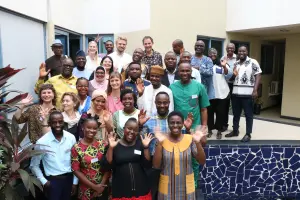
Between inclusiveness and othering
Laura Lambert attended Certizens workshop on changing ID systems in West Africa
DigID’s close sister research project Certizens organized a regional workshop on changing ID systems in West Africa. The workshop united about 30 researchers working on Ghana, Nigeria, Burkina Faso, Benin and Mali. Laura was able to present preliminary findings on her work on Justices of the Peace as important intermediaries – and a British postcolonial legacy – in Sierra Leone’s digital identification system.
The brilliant case studies showcased that the many challenges are shared between more and less powerful states in West Africa. States barely achieve rolling out biometric registration to rural and other marginalized populations and often fail in making birth registration possible. They discriminate against minorities in the registration based on local notions of postcolonial nationalism and indigeneity. With the introduction of digital ID systems, it frequently becomes an issue that people are seen as not indigene or citizen, even if their families have been longer in the country than the state exists.
On a more positive note, West African governments have often found mechanisms of vouching or self-reporting to include people without documents and prevent statelessness. It remains a serious question, however, if SDG16.9 "legal identity for all, including birth registration" can be reached by 2030.
The workshop was organized by Prof. Amanda Hammar, Dr. Kojo Opoku Aidoo and the whole Certizens Project Team.
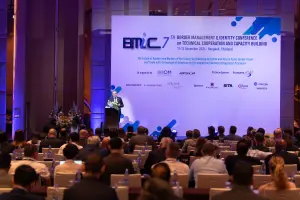
DigID Researchers Attended the 7th Border Management Identity Conference (11-13.12.2024)
Kelly Bescherer and Sindhunata Hargyono joined the 7th Border Management Identity Conference (BMIC7). The conference was jointly organized by the International Organization for Migration (IOM) and Asia Pacific Smart Card Association (APSCA) in Bangkok, Thailand.
BMIC7 had “The Future of Borders and Borders of the Future” as its theme. It convened around 470 participants from governments, international organizations, the private sector, and academia. BMIC itself has evolved from an Asia-Pacific focused forum into a more global stage for policy and technology actors working at the intersection of border control and identity management as evident from the participation of the European Border and Coast Guard Agency (FRONTEX), United Nations High Commissioner for Refugees (UNHCR), the Office of the United Nations High Commissioner for Human Rights (OHCHR), the International Civil Aviation Organization (ICAO), and others. The conference had a dedicated exhibition space that showed a broad spectrum of technologies: passports, electronic chips, smart cards, digital travel credentials, biometric kits, automated e-gates, document readers, AI-powered dashboard, etc. Amid these older and newer techs at the exhibition space, an industry actor shared with DigID researchers that they think the technology for document-less—thereby, seamless—travel is ready; it is just a matter of governments adopting them within their procedural frameworks.
Discussions across the three days touched on a range of intertwined issues: the push for seamless mobility through automation, the need for secure and interoperable digital identities, and balancing between facilitating and controlling mobilities. As expected, the language of technological innovation was prominent. However, several sessions pointed out that there are risks of over-reliance on technological solutions as it might reduce the room for human discretion while also leaving crucial decisions to be governed by algorithmic bias. Civil registration systems and legal identity frameworks were also a theme covered by the conference, particularly framed as foundational to inclusive governance despite potential gaps in implementations among marginalized populations such as migrants, the stateless, and those in remote areas.
One of the main future imaginaries being imagined at the conference was using digital technology to realize a more frictionless travel that would render obsolete check-lockets and/or automated gates. However, a question lingers to the implicit preconditioning to be able to participate in this regime of mobility: being documented, passport privilege, and digital fluency. Then, the question becomes, whose mobility is being facilitated and at what cost?
BMIC7 provided a timely window for DigID researchers to trace contemporary institutional imaginaries, governance logics, and technical infrastructures that are shaping the landscape of digital identity and cross-border mobilities.

DigID’s 3rd International workshop: "Ontologies and Epistemologies in Science and Technology Studies"
On the 23rd and 24th of October, the DigID team gathered with a group of global scholars for the project’s 3rd international workshop "Ontologies and Epistemologies in Science and Technology Studies" at Leuphana University, Lüneburg.
The workshop kicked off with a keynote lecture on “A Politics of Neglect: Trailing Life and Death in a Postcolonial Landscape” by Prof. Amade M’Charek (University of Amsterdam). It was then proceeded by a hands-on workshop, where conceptual and methodological research puzzles were actively discussed.The main aim of this workshop was to discuss the various theoretical assumptions and methodological consequences that exist and arise in interdisciplinary Science and Technology Studies (STS). Questions were addressed such as how can we understand materiality and technology and what are the epistemological sensibilities that connect the two? Additionally, what distinguishes traditional ethnographic and post-structuralist approaches from post-ANT approaches? We also sketched out how methods can and should reflect our theoretical assumptions and how we can compare situated descriptions in transnational case studies.
These questions and many more were addressed in our 3 sessions. The first centred around discussing the theoretical sensibilities in established and emerging STS scholarship. This was followed by a session on comparison and methodological practices in STS. Finally, scholars were given the chance to present their specific cases in smaller breakout groups. The full programme can be found here.
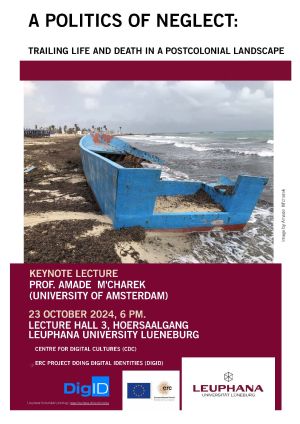
Keynote Lecture "The Politics of Neglect: Trailing Life and Death in a Postcolonial Landscape"
by Prof. Amade M'Charek (University of Amsterdam)
23.10.2024 at 6pm CET, Lecture Hall 3, Leuphana University Lüneburg
Since 2014 more than 26.000 people have drowned in the Mediterranean Sea. They have been attended to as “border death” (Last & Spijkerboer 2014), crucially, drawing attention to the militarization of Europe’s borders and its migration policy. But what if we would make a decolonial move and cross the Mediterranean, move from Europe to Africa? What if we would attend to death, not in relation to borders that kill, but in relation to life and livelihood?
The starting point for this talk are the beaches of Zarzis, a southern Tunesian harbour town, where dead bodies have been washing ashore since the mid-nineties. I ask, "how did these bodies end up here?" A forensic question that I will not engage in any self-evident way. I reconfigure forensics, from an art of finding evince and closure, to an art of paying attention. A mode of opening up and articulating complex entanglements.
Inspired by forensics, its attention to materialities and temporalities as well as its tenet of following heterogeneous traces, I query the relation between death and the possibilities for life and livelihood by trailing what I call vital elements; materialities that are crucial for fostering live or causing death in their absence. Think of phosphorus, salt, water, or, sea sponges. Moving with, and being moved by these materialities and the way they have been part of extractivist practices, I will tell two stories to attend to the durability of unequal, (post)colonial relation, (1) underscoring what can flow easily between Europe and Africa and what is being stopped, (2) contributing to aconceptualization of neglect.
Amade M’Charek is Professor of the Anthropology of Science at the Department of Anthropology, University of Amsterdam. Her research interests are in forensics, forensic anthropology and race.
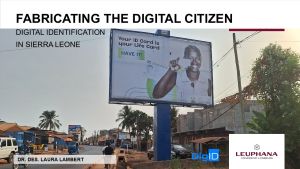
Fabricating the Digital Citizen: Laura Lambert on Sierra Leone at VAD Conference Bayreuth
Laura Lambert presented first insights from her field research on the making of digital identities in Sierra Leone at the biannual conference of the Association for African Studies in Germany (VAD) at the Institute of African Studies, University of Bayreuth, in early October 2024. The Conference, themed Reconfigurations in Africa – and in African Studies, brought together about 600 researchers of whom a relevant percentage were of African descent.
Laura contributed a presentation to a panel on the reconfigurations of the political in the digital by Claudia Favarato and Monika Rohmer. Her paper addressed the Fabrication of Digital Citizens in Sierra Leone. Underlying the government’s digitalization program is the imaginary of a middle-class citizen who, as a cosmopolitan and tech-savvy entrepreneur, contributes to the emerging start-up economy and the stability of the country, but is potentially less a bearer of rights (in terms of civil certification and data protection). Beyond the often-discussed exclusions inherent in digital ID programs, Laura pointed to some of the subjectivating and disciplining effects of such imaginary on citizens.

Regimes of Proof: Kelly Bescherer presents paper at the annual IMISCOE Conference at the ISCTE University Institute of Lisbon
In July, PhD. researcher Kelly Bescherer attended the four-day annual conference of the IMISCOE network workshop at the ISCTE in Lisbon. She presented the results of collaborative research with Stephan Scheel on the central role of identity documents within contemporary migration management and related struggles of migrants in the context of asylum, regularization and deportation procedures. IMISCOE is a major international network for transdisciplinary migration studies, comprising 69 members institutes and 1400 scholars. In Lisbon, several hundred researchers convened to discuss the conference’s focus “Migration as a Social Construction: A Reflexive Turn”.
In her presentation, Kelly drew on ethnographic research that she and Stephan carried out in West Africa and Germany on identification practices. She focused especially on the example of struggles around birth registration in Germany, and the great difficulties that many West African migrants experience in registering the births of their children at German registry offices, as well as the significant negative consequences this exclusion carries for affected families. Such difficulties occur because the German foreign office, registrars, and immigration office workers often systematically claim that their statements and the identity documents they provide are unreliable. The paper she presented develops the notion of “regimes of proof” to explain the importance of negotiations around identity in the context of asylum, deportation, and regularisation procedures, highlighting identification practices’ epistemic, performative, sociotechnical, and contested nature.
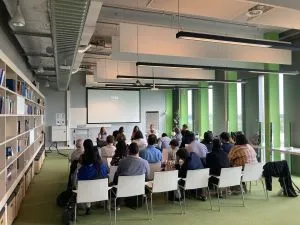
Citizenship deferred: Stephan Scheel presents paper at the 5th meeting of the Bhalisa network at the University of Amsterdam
In July, Stephan Scheel, principal investigator of the DigID-project, attended a two-day workshop at the University of Amsterdam where he presented first results of his research on birth registration in Sierra Leone. The workshop was organized by the Bhalisa-network which counts more than 200 researchers and practitioners who work on the political, economic and social effects of the implementation of digital civil registration and identification systems. About 50 network-members participated in the workshop in Amsterdam, most of them presenting on various aspects and instances of digital identification systems, from the setting of global standards to the European Digital Identification Wallet (EUDI) and the build-up of centralized databases for civil registration purposes in the Caribbean and on the African continent.
In his presentation Stephan focused on the implications of the digitization of Sierra Leone’s civil registration and national identification system for birth registration procedures. The new system requires that a unique, eight-digit national identification number (NIN) is generated for the child before a birth certificate can be issued. The NIN is generated by a central server in Freetown after basic biographic data on the child and its parents has been submitted by one of the district offices of the National Civil Registration Authority. However, due to internet connectivity problems the district offices have not issued any of the new birth certificates in the past three years. Hence, hundreds of thousands of children who have been born since 2020 have been left without a birth certificate. In his presentation, Stephan used the lens of citizenship to analyze the implications of the non-issuance of birth certificates. A central argument of the paper is that the breakdown of the infrastructures of citizenship – that is: the technical devices and material artefacts that are needed to enact citizenship as a formal relation to the state and a form of political belonging – brings the importance of the material and temporal dimensions of citizenship to the fore. In the case under study, the non-issuance of birth certificates implicated by the failure of infrastructures of citizenship means that formal citizenship is deferred to a distant, unspecified future.
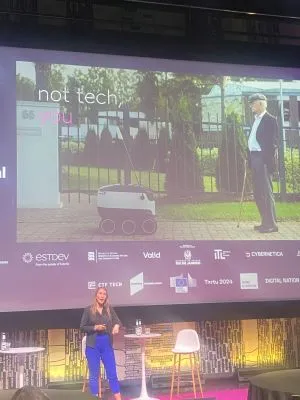
Unlocking Digital Success: e-Governance conference 2024, Tartu, Estonia.
DigID researcher Oisin O’Brien attended the 2024 e-Governance conference in Tartu to learn about the existing public services that e-identification allows Estonians to access and the potential of people-centric services.
The 10th edition of the e-Governance conference took place in Tartu on May 22-23. This conference aims to provide attendees with the opportunity to learn from Estonia’s digital transformation experience and exchange ideas with speakers from around the world on topics including e-government services, e-identification and cybersecurity culture. The conference was attended by over 500 participants from 67 countries. The majority of attendees were politicians, policy makers and digital governance stakeholders. 71 speakers from 5 continents took part in the various panels over the 2 days of the conference, and in between attendees had the opportunity to learn about digital services and platforms from around the world in the expo hall.
The focus of the conference was not only on success but rather on how to mobilize failure into future success stories. Erika Piirmets highlighted this in her panel on Estonia’s digital renaissance. Piirmets claimed that the only guarantee with technology is that it will fail you and having a strong digital crisis management plan is what has galvanized Estonia as a digital leader. The talk then turned to the post-digital. In Estonia, the Ai strategy known as Kratt was one element of what will become a larger ecosystem of post-digital services.
The conference highlighted that there are many different names for the same concept. In various panels, the terms personal government, citizen-centric services, intuitive services, post-digital services and proactive services were used interchangeably. This observation encouraged me to explore the nuances of each of these phrases.
Another central issue explored throughout the panels was the European identity wallet. The roles and rights of citizens were stressed in how the project was pitched in the ‘opening Pandora’s wallet’ – panel. The wallet will have to fit into the existing mature ID ecosystem in Estonia, and different stakeholders I spoke with in the expo hall had contrasting takes on how the EU wallet will function. Is it purely an interoperability tool? Or something more? As a PhD student, the conference raised new questions that have led me to explore new directions in my research. It also allowed me to meet potential participants, as I prepare to enter the field.
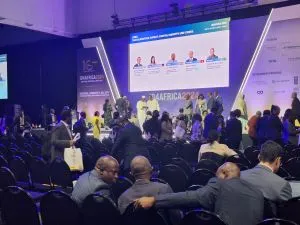
Ethnographic engagements with the transnational field of identification: ID4Africa in Cape Town
DigID researcher Laura Lambert joined the ID4Africa conference in Cape Town in May 2024 to get a feel of the transnational field of digital identification.
Over 4 days, more than 2000 delegates convened in the prestigious halls of Cape Town International Convention Centre to discuss the trends of ID products on the African continent. The sheer size and professional ambiance of this 10th anniversary demonstrated what its founder Dr. Joseph Atick, a senior in the biometrics industry, did not tire to perform: that ID4Africa has become the main venue for cutting-edge ID products in Africa.
The conference made sure to put African officials and civil society members frontstage. Yet, a relevant number of attendees belonged to biometrics and other tech companies, International Organizations, civil society and academia. I also met European officials invested in migration control who used the opportunity to learn more about identity processing in individual African countries.
A shared perspective between these diverse actors seemed to be that digital IDs are the way to go and will help African states develop, enhance trust and include citizens. The ID4Africa theme song called on the individual countries: “The time has come, the time is now for every nation to own ID”. Issues of exclusion and policy priorities for states often struggling with polycrises were not part of the conference program.
During the sessions, most African officials gave a rather glossy image of their progress. Most of these discussions can be found on youtube and could save one the conference fee of 800 USD for researchers. Implementation issues such as electricity and internet connectivity problems in rural areas were hardly addressed in these talks. Having just conducted ethnographic fieldwork in Sierra Leone on the actual roll-out of ID, this was a surprising find. The representation of progress, easy fixes and inclusion as the promises of digitalization in the transnational field concealed the many implementation challenges on the ground in individual countries. Its glossy and thus rather superficial presentation reduced the opportunity for critical engagement and mutual learning between practitioners. It also limited the opportunity for us researchers to get a comparative overview on implementation challenges across Africa.
A way to mitigate this was seeking one-on-one conversations with officials during the breaks or with the vendors at the tech exhibition. These informal conversations were often more insightful on actual developments. Another avenue – the informal side events during the conference organized by major tech companies and the World Bank – required researchers to ‘own’ the field, to mobilize considerable social and symbolic capital in the transnational sphere.
These frictions between the local and the transnational, between implementation and representation, methodologically point to the need to investigate both ethnographically.
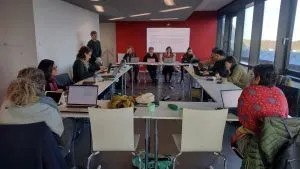
DigID’s 2nd International Workshop: “Proliferations of digital identification infrastructures in the (post) colonial world: Trust Relations, Methodologies and Translations.
From 31 January to 1 February 2024, the DigID project kicked off the new year with its second international workshop at Leuphana University, Lüneburg.
Around 20 researchers from European and North American universities came together for a 1.5-day hands-on workshop to discuss the proliferation of digital identification infrastructures.
This workshop explored how technical interfaces and infrastructures rapidly adapt into diverse sociocultural, environmental and technical ecosystems across national borders. The workshop highlighted how proliferations feature and hinge on multiple translation processes: reproduction, reassembly and reconfiguration. The workshop addressed many questions including: Are trust generating mechanisms embedded in digital infrastructures? How can we methodologically account for the role of humans in the work of digital identification? Do the proliferation of digital infrastructures in (post)colonial settings generate political contestation?
The team unpacked these questions and observations with a group of selected scholars. We began our workshop with a keynote lecture on "Can Trust be Engineered" by Prof. Keith Breckenridge (University of the Witwatersrand). The workshop itself included two panels and one roundtable discussion on a variety of methodological and conceptual themes.
You can find the programme here.
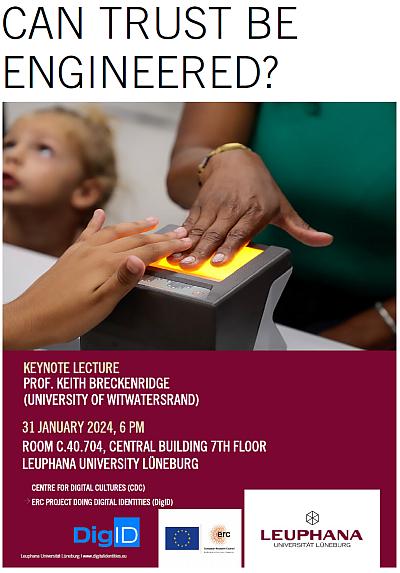
Keynote Lecture "Can Trust be Engineered?"
by Prof. Keith Breckenridge (University of the Witwatersrand)
31.01.2024 at 6 pm CET in the central building, C.40.704 Leuphana University.
Keynote Abstract: Many countries on the African continent are building powerful new biometric population registration systems. Often matched with new credit scoring regulations and – in some cases -- digital payment switches, these tools are designed to have powerful effects on finance. The advocates of these systems describe them as trust infrastructures, mainly because they can be used to simplify payments and strengthen credit distribution in the context of unreliable identification and collateral systems. But what is trust? And can it be generated technologically? These are especially important questions on the African continent where, as Celestin Monga and many others have shown, trust has been radically curtailed over centuries. In this paper I explore the geopolitics of trust over the last century and suggest what will be necessary if the biometric infrastructures are, indeed, to build trust.
Keith Breckenridge is a Professor and acting Co-Director at Wiser. He holds the Standard Bank Chair in African Trust Infrastructures. Keith studied at Wits and Johns Hopkins and completed his PhD at Northwestern in 1995. He writes about the cultural and economic history of South Africa, particularly the gold mining industry, the state and the development of information systems. For the last twenty years he has been writing about biometric identification systems and their political effects, especially on the African continent. His book -- Biometric State: the Global Politics of Identification and Surveillance in South Africa, 1850 to the Present (Cambridge, 2014) -- shows how the South African obsession with Francis Galton's universal fingerprint identity registration served as a 20th century incubator for the current systems of biometric citizenship being developed throughout the South. In 2017 the book was awarded the inaugural Humanities Book Award by the Academy of Science of South Africa. With Simon Szreter, he edited Registration and Recognition: Documenting the Person in World History published by OUP and the British Academy in 2012, a volume of essays which examines the workings and failures of civil registration in twenty different regions and periods around the world. He has published widely on the history and contemporary politics of biometrics, with papers in Africa, History Workshop, the Journal of Southern African Studies, Public Culture and comparative anthologies on systems of identification (the full list is here). This interest in biometrics has also drawn him in to the global institutional history of state documentation, especially the forms of birth, death and marriage registration that are ubiquitous (but very poorly understood) in Europe, Asia and the Americas (see http://wiser.wits.ac.za/futureID).
He is now working to finish several book projects: Biometric Capitalism, which investigates the global infrastructures of biometric civil registration and credit surveillance that are developing in the former colonial world; Power without Knowledge, which examines the very limited forms of official knowledge that supported the state in South Africa in the 19th, 20th and 21st centuries; and Mining, Power and Politics in South Africa which interrogates the usefulness of the idea of the Resource Curse in South African history.
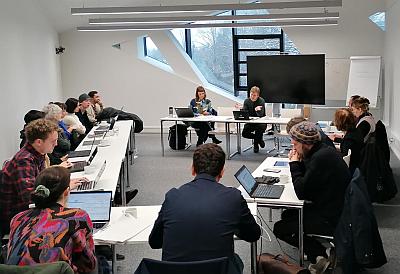
International Workshop "Enacting Citizenship in the Digital Age"
From 30 November to 1 December 2023, the DigID project organised its first international workshop at Leuphana University, Lueneburg. About 20 researchers from different European universities came together for a 1.5-day hands-on workshop to discuss how citizenship is reconfigured in the digital age.
This workshop examined how the digitization of border and citizenship regimes – as highlighted by the move towards eGovernance, eDemocracy, eVoting and ‘smartborders’ – affects struggles over the right to have rights and people’s possibilities to enact themselves as political subjects. The workshop focused on three central questions. First, how and where do acts of citizenship occur when public assembly and direct state-citizens interactions become rare in the digital age? Which methods and research practices can we develop to actively engage with these protagonists and follow their struggles and practices of contestation, dissent and negotiation? And how does the digitization of social, economic and political life call for a more thorough (re-)consideration of material citizenship, that is, the material affordances, artefacts and infrastructures that are needed to enact citizenship?
These issues were addressed in three respective panels and a public lecture on "Performing Digital Data Rights" by Prof. em. Evelyn Ruppert (Goldsmiths, University of London). You can find the programme here.
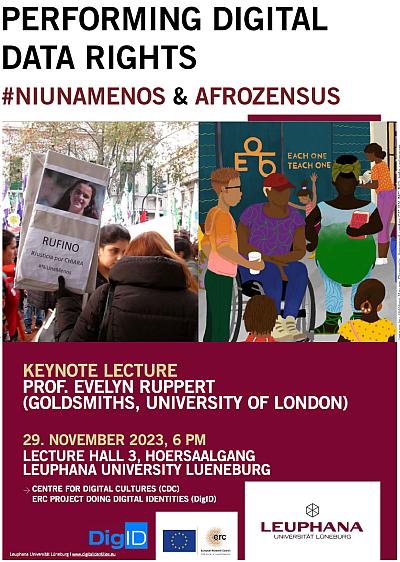
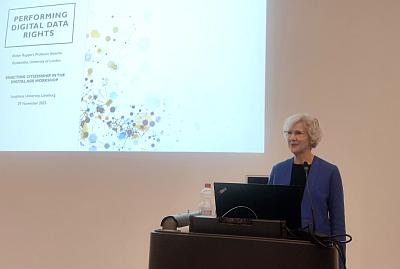
Keynote Lecture: "Performing Digital Data Rights" (Prof. em. Evelyn Ruppert, Goldsmiths/ University of London)
The DigID project organised its first keynote lecture at Leuphana University, Lueneburg on 30 November 2023. It was given by Evelyn Ruppert.
The keynote addressed the following themes: What are the possibilities of performing effective and creative politics in increasingly digitised societies? How do subjects struggle to revolt, subvert and evade digital assemblages that track, troll, visualize, control, discipline, surveil and datify their acts and actions? How might we conceptualise such acts of resistance as data rights claims that subjects make when they act in or through digital technologies? Evelyn Ruppert approached these questions by considering two citizen-led enumeration practices. One was the #NiUnaMenos (Not One Woman Less) movement in Argentina which makes rights claims to the collection and presentation of data about violence against women. The second was the Afrozensus project based in Germany that creates alternative census data about the experiences of discrimination and underrepresentation of African-descendants. Prof. Ruppert suggested that through a complex assemblage of legal, performative, and imaginary forces these practices perform ‘I, we, they have a right to’ challenge and perform alternative data about who we are as citizens.
Evelyn Ruppert is Professor Emerita in the Department of Sociology, Goldsmiths, University of London. Her research focuses on how digital technologies such as smart phones, social media platforms, as well as myriad government databases generate enormous volumes of data about the movements, preferences, associations, and activities of people. While providing new sources of knowledge about individuals and populations, she investigates how digital technologies and the data they generate can also powerfully shape and have consequences for who we are and how we are known and governed. As such, digital technologies are also changing how we understand ourselves as political subjects, that is, citizens with rights to speech, access, and privacy. How citizens make claims to digital rights through what they say and what they do through digital technologies are key questions that she addresses. Evelyn was Principal Investigator of a five-year European Research Council funded project, Peopling Europe: How Data Make a People (ARITHMUS; 2014-19). Recent books are all Open Access: Data Practices: Making up a European People (co-edited with Stephan Scheel); Being Digital Citizens (2015; 2020; co-authored with Engin Isin); Data Politics: Worlds, Subjects, Rights (2019; co-edited with Didier Bigo and Engin Isin); and Modes of Knowing (2016; co-edited with John Law).